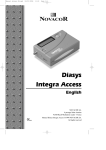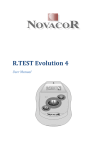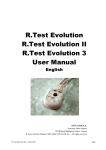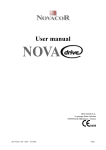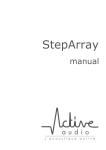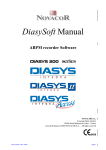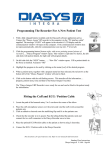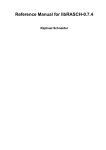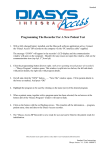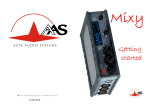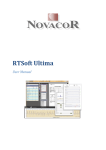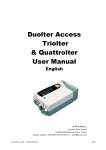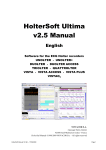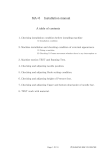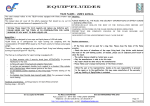Download Diasys Integra Access English
Transcript
Manuel Access GB REV04-12-2010_Manuel Access GB.qxd 13/12/2010 14:43 Page 1 Diasys Integra Access English NOVACOR SA. 4 passage Saint-Antoine 92508 Rueil-Malmaison cedex - France Manual Diasys Integra Access ©1999 NOVACOR SA. All rights reserved Manuel Access GB REV04-12-2010_Manuel Access GB.qxd 13/12/2010 14:43 Page 2 1. Introduction 4 2. Guarantee 5 2.1. Specific Guarantees concerning units 5 2.2. Accessories 5 2.3. Restrictions of the Guarantee 5 2.4. Responsibilities 5 2.5. User Information 6 2.6. Rights 6 3. How the Diasys Integra Access Functions 7 4. Description of the equipment 8 Diasys Integra Access and Standard Accessories Optional accessories 8 8 4.1. The Diasys Integra Access recorder 9 4.2. 4.3. The battery charger The cuff and the connecting tube to the Diasys Integra Access 10 11 5. Preparing the Diasys Integra Access for monitoring 12 5.1. Preparing the battery 5.1.1. The battery charger 5.1.2. The battery 5.1.3. Charging the battery 5.1.4. End of charge 13 13 15 15 16 5.2. Inserting the battery into the recorder 5.2.1. Insertion 5.2.2 Safeguard battery (non-rechargeable lithium) 17 17 18 5.3. Programming the Diasys Integra Access 5.3.1. Programming the time 5.3.2. Programming the date 5.3.3. Programming the intervals 18 20 21 22 5.4. Placing the unit on the patient 5.4.1. Positioning 5.4.2. Recommendations for placing the cuff 5.4.3. Changing arms 5.4.4. Positioning the Diasys Integra Access with the integrated position sensor (optional) 23 23 25 26 2 • Diasys Integra Access - Manual GB - REV04-12/2010 27 Manuel Access GB REV04-12-2010_Manuel Access GB.qxd 13/12/2010 14:43 Page 3 Summary 28 6.1. Start up 28 6.2. Test measurements 28 6.3. Manually activated measurements 29 6.4. Palliative measurements 29 6.5. “Suspend” mode 30 6.6. Measurements which are not memorised 30 6.7. Display of measurements 30 6.8. Stopping measurements 31 6.9. Display codes 32 7. Reading the recordings 33 7.1. Transfer to a PC or a printer 33 7.2. Modem Data Transmission (optional) 34 8. Maintenance 36 8.1. Handling the equipment 36 8.2. Cleaning the equipment 36 8.3. Maintenance 36 8.4. Calibration test 37 8.5. Replacing the safeguard battery 38 8.6. Storing and dispatching 38 8.7. Preventative maintenance 39 8.8. Norms and safety standards 39 8.9. Precautions of use 43 8.10. Physical specifications 43 8.11. Technical specifications 44 8.12. Accessories 44 Diasys Integra Access - Manual GB - REV04-12/2010 • 3 English 6. How the unit functions Manuel Access GB REV04-12-2010_Manuel Access GB.qxd 13/12/2010 14:43 Page 4 1. Introduction The Diasys Integra Access is a non-invasive ambulatory system for measuring and recording blood pressure in oscillometric mode. It measures the systole, the diastole, mean blood pressure and the heart rate for up to 48 hours. The Diasys Integra Access unit weighs about 200g and contains the electronic system and pneumatic inflation module. It is linked to the patient’s cuff with a tubing system. The measurements made by the Diasys Integra Access can be printed out directly in report form by a printer connected to the unit. If a computer is used, recording conditions and criteria can be fixed, and the results of the procedure can be selected, organised, stored and printed out in a fully customised report. 4 • Diasys Integra Access - Manual GB - REV04-12/2010 Manuel Access GB REV04-12-2010_Manuel Access GB.qxd 13/12/2010 14:43 Page 5 2. Guarantee 2. Guarantee NOVACOR undertakes to deliver merchandise conforming to the technical specifications mentioned and to replace any merchandise recognised as being defective. Specific guarantees concerning units Each unit is identifiable by a specific serial number. NOVACOR guarantees the unit (Diasys Integra Access and charger) for one year from the date of delivery against any defect resulting in abnormal functioning of the unit. 2.2. Accessories Equipment which is not an integral part of the unit, in particular the accessories and cables, are not covered by the guarantee. Cables with serial numbers are guaranteed for three months. 2.3. Restrictions of the guarantee The guarantee does not apply to: 1. units repaired or opened outside our workshop. 2. units damaged by negligence, by accident or if the user instructions have not been followed correctly. If necessary contact your distributor or our after sales service. We do not accept units returned without prior agreement. 2.4. Responsibilities NOVACOR will not, under any circumstances, be held responsible for physical or material damage of whatever nature, arising either directly or indirectly from improper use of the unit or from failure to follow the instructions in the user manual. Although NOVACOR manufactures products to the highest standards, it cannot be held responsible for the validity or the accuracy of the measurements made by its units. Diasys Integra Access - Manual GB - REV04-12/2010 • 5 English 2.1. Manuel Access GB REV04-12-2010_Manuel Access GB.qxd 13/12/2010 14:43 Page 6 2.5. User information All customers duly registered with NOVACOR, or where applicable, with one of its distributors, will be kept informed, to the best of NOVACOR’s ability, of any upgrades and developments to the Diasys Integra Access as they become available. 2.6. Copyrights Diasys Integra Access Manual © 1999 Novacor S.A.All rights reserved. Diasys Integra Access, DiasySoft, and their respective logos, are registered trademarks of NOVACOR S.A. Macintosh is a registered trademark of Apple Computer International. MS-DOS and Windows are registered trademarks of Microsoft Corporation. 6 • Diasys Integra Access - Manual GB - REV04-12/2010 Manuel Access GB REV04-12-2010_Manuel Access GB.qxd 13/12/2010 14:43 Page 7 3. How the Diasys Integra Access functions The Diasys Integra Access is a non-invasive automatic ambulatory blood pressure recorder operating in oscillometric mode. The oscillometric measurement is based on analysis of the shape of the oscillometric curve of the cuff pressure, of which the maximum point represents the mean pressure. The patient’s arm must stay still during measurement. The Diasys Integra Access also has an optional integrated position sensor enabling the unit to detect whether the patient is vertical (awake) or horizontal (resting). Diasys Integra Access - Manual GB - REV04-12/2010 • 7 English 3. How the Diasys Integra Access functions Manuel Access GB REV04-12-2010_Manuel Access GB.qxd 13/12/2010 14:43 Page 8 4. Description of the equipment Diasys Integra Access and standard accessories • Diasys Integra Access recorder, • Two rechargeable NiMH batteries (same as Diasys Integra batteries), • Standard adult sized cuff, • Protective pouch and belt. Optional accessories • Battery charger, • DiasySoft software, customised according to the programming options required and the user’s language and access key, • Printer, • Diasys-Printer or Diasys-Computer linking cabl,e • Diasys-Modem linking cable. 8 • Diasys Integra Access - Manual GB - REV04-12/2010 Manuel Access GB REV04-12-2010_Manuel Access GB.qxd 13/12/2010 14:43 Page 9 4. Description of the equipment M P Mode selector M = measurement / P= program P mode: display switched on (On) and validation of options (Valid) M mode: monitoring started (On) and activation of a manual recording (Rec) Air connector Rec On/Valid Stop Select RS232 connector for printer or modem P mode: next choice (Select) M mode: stop measurements (Stop) Battery cover Diasys Integra Access - Manual GB - REV04-12/2010 • 9 English 4.1. The Diasys Integra Access recorder Manuel Access GB REV04-12-2010_Manuel Access GB.qxd 13/12/2010 14:43 Page 10 4.2. The battery charger The Diasys Integra Access functions exclusively with a high capacity rechargeable battery (NiMH), making it economical and environmentally friendly. Batteries are recharged with a fast battery charger specially designed for the Diasys to ensure optimum performance and long-life. The charger is connected to the mains outlet via a transformer and has two lights on the front panel. 10 • Diasys Integra Access - Manual GB - REV04-12/2010 Manuel Access GB REV04-12-2010_Manuel Access GB.qxd 13/12/2010 14:43 Page 11 4. Description of the equipment 4.3. The cuff and the connection tube to the Diasys Integra Access The Diasys Integra Access cuff offers features specially designed for ambulatory recording: • Stabilising flap for optimal positioning, to be used with adhesive pads • Easy handling • Washable material Diasys Integra Access - Manual GB - REV04-12/2010 • 11 English • Cone-shaped for better ergonomics Manuel Access GB REV04-12-2010_Manuel Access GB.qxd 13/12/2010 14:43 Page 12 5. Preparing the Diasys Integra Access for monitoring To prepare the unit, follow the instructions below. • Charge the battery • Insert the battery • Program the unit • Place the unit on the patient • Start up the unit and carry out the test measurements 12 • Diasys Integra Access - Manual GB - REV04-12/2010 Manuel Access GB REV04-12-2010_Manuel Access GB.qxd 13/12/2010 14:43 Page 13 5. Preparing for monitoring 5.1. Preparing the battery 5.1.1. The battery charger Red light low brightness : power normal brightness blinking: discharging normal brightness fixed: charging Green light: end of charge The front panel There is an indicator light (LED) on each side of the slot into which the battery is placed. The RED light indicates: • That the charger is working correctly when it is plugged into the mains outlet: fixed light - low brightness • That the battery is being discharged, when discharge prior to charge has been programmed (see chapter 5.1.3): blinking light- normal brightness • That the battery is being charged: fixed light - normal brightness Diasys Integra Access - Manual GB - REV04-12/2010 • 13 English The Diasys charger is fast, fully automatic and easy to use. Manuel Access GB REV04-12-2010_Manuel Access GB.qxd 13/12/2010 14:43 Page 14 The green light indicates that the operation is finished and the battery is charged. The back panel (base) A selector (2 red switches) determines the charge mode to ensure a long life of the batteries, it is advisable not to change the position of these switches. ON ON 1 2 1 2 It is, however, possible to implement an immediate charge by changing the position of switch 1: SWITCH 1 /ON discharges the battery before recharging it (factory setting) SWITCH 1 /OFF immediate charge • Whichever mode is chosen, the green light comes on when the battery is charged indicating that it is ready to be used. • The position of switch 2 should never be changed and should always remain in the position shown above. • Never use the charger with any batteries other than those supplied by NOVACOR. • External power sources must comply with EN 60-601 standards. 14 • Diasys Integra Access - Manual GB - REV04-12/2010 Manuel Access GB REV04-12-2010_Manuel Access GB.qxd 13/12/2010 14:43 Page 15 5. Preparing for monitoring 5.1.2. The battery Precautions to be taken with the batteries: • Take care not to invert the polarities. • Do not store at over 45°C. • Do not exceed the recommended recharge time, otherwise the unit risks stopping during a recording. 5.1.3. Charging the Battery 2 1 R m S a p b nu ec ia y P fa lly an ct as ur o ed n ic . ef .D N 10 -1 E H IE L A R B E A m T E 50 T A G 5 B AR V H C ,6 E 3 R HiM 00 0 • Plug the charger into a compatible mains outlet (check carefully that the voltage marked on the charger transformer corresponds to the voltage of your mains supply): the red light will come on immediately with low brightness. • Place the battery in the charger, taking care to match the + and - signs with those on the charger. • Insert the battery into its slot. Diasys Integra Access - Manual GB - REV04-12/2010 • 15 English The Diasys Integra Access is delivered with two rechargeable Nickel-Metal Hydride (NiMH) batteries. These batteries have been specially developed for the Diasys series and can be recharged about 300 times if used according to the recommendations in this manual. Manuel Access GB REV04-12-2010_Manuel Access GB.qxd 13/12/2010 14:43 Page 16 • When the battery is placed in the charger the red light will become brighter and will be either: - fixed (immediate charge), - flashing (discharge before recharge). • Duration of charge cycle: - Without prior discharge: about a maximum of 1 hour. - With prior discharge: discharge (up to 1½ hrs) plus charge (about 1 hr). • Do not use a different non-Novacor charger to recharge Diasys Integra Access batteries. • Go through the charge cycle: - Systematically when new batteries are used for the first time. - At least once a year if the batteries are not in regular use. - If the battery has been stored out of the charger for more than 2 weeks since last being charged 5.1.4. End of charge When the green light is on the battery is ready to be used and can be removed for storage or left in the charger up to one week until required. Caution: if a charged battery is removed from the charger and not used for more than two weeks, we recommend that it be recharged. • Do not leave a battery in the charger if it is not plugged into the mains, it will quickly lose its charge! • Do not leave the charger plugged into the mains for a long period of time. • Do not leave a charged battery in a charger plugged into the mains for a long period of time. • Do not start a recording using a battery only partcharged, the unit may stop during a measurement. 16 • Diasys Integra Access - Manual GB - REV04-12/2010 Manuel Access GB REV04-12-2010_Manuel Access GB.qxd 13/12/2010 14:43 Page 17 5. Preparing for monitoring 5.2. Inserting the batteries into the recorder 5.2.1. Insertion • Slide off the battery cover. • The arrow on the battery should be pointing towards the bottom of the compartment (as shown below). If it is difficult to insert the battery do not force it. Check that the above instructions have been carefully followed before trying again. • Holding the battery in place, slot the battery cover back into the grooves and slide it into place. • The battery must be replaced before each new clinical procedure. 0 100 10f. D Re R BA NiMECH TTE H - ARGRIE 3,6 EA V - BL 55 E 0m AH • Do not store the Diasys with a discharged battery inside. Do not leave a recharged battery in the Diasys for more than 2 weeks without using it. y d . ll re ic ia u n c t o e cs p fa a S u n n a a P my b Diasys Integra Access - Manual GB - REV04-12/2010 • 17 English Slide off the battery cover, if there is already a battery in the unit, remove it. Insert a recharged battery into the unit taking care not to invert the polarities. Manuel Access GB REV04-12-2010_Manuel Access GB.qxd 13/12/2010 14:43 Page 18 5.2.2. Safeguard battery (non-rechargeable lithium) The Diasys Integra Access has a safeguard battery enabling program settings and data in memory to be protected if the main battery fails or is missing, thus providing the user with maximum security. The safeguard battery will normally last for 3 to 5 years. It is not accessible to the user. Its status is systematically tested every time an NiMH battery is placed in the unit, as follows: When the battery is inserted, the Diasys Integra Access automatically tests the safeguard battery and displays one of the following messages for 3 seconds either indicating that the lithium battery is functioning properly, or indicating that the lithium battery is not functioning (see chapter 8 “replacing the safeguard battery”). 5.3. Programming the Diasys integra Access M P (mode selector in Programming position) This manual only concerns manual programming. Software programming is fully explained in the DiasySoft manual. We recommend that a recharged battery be inserted each time before programming. If the battery is run down, the Diasys Integra Access will display the message (ER 14), if it is dead, the unit’s keys will be blocked (safeguard mode). 18 • Diasys Integra Access - Manual GB - REV04-12/2010 Manuel Access GB REV04-12-2010_Manuel Access GB.qxd 13/12/2010 14:43 Page 19 During programming, if the selector or the two programming keys are not used for a certain time, the screen will switch off to save battery power. Press one of the keys to retrieve the time screen. Diasys Integra Access - Manual GB - REV04-12/2010 • 19 English 5. Preparing for monitoring Manuel Access GB REV04-12-2010_Manuel Access GB.qxd 13/12/2010 14:43 Page 20 5.3.1. Programming the time Press Valid to display the time. Press Select and the first digit will flash. Stop Rec Select On/Valid Stop Rec Select Press Select to obtain the correct digit. Stop Select Press Valid to confirm. The second digit will flash. Adjust the second digit and press valid to confirm. The AM/PM setting will flash. Press Valid to make AM flash. If PM is required, press Select, then Valid. When the last digit has been validated, all four digits will flash. Press Valid to confirm the time. The date will be displayed. Rec On/Valid Stop Rec Select On/Valid Stop Rec Select On/Valid Stop Rec Select Adjust the two minute digits as above. On/Valid On/Valid Stop Rec Select On/Valid Stop Rec Select On/Valid Note that the AM/PM setting is only proposed if the time is programmed before midday. 20 • Diasys Integra Access - Manual GB - REV04-12/2010 Manuel Access GB REV04-12-2010_Manuel Access GB.qxd 13/12/2010 14:43 Page 21 5. Preparing for monitoring Press Select to choose the date format (dd-mm or mm-dd). Press Valid to confirm. The first digit will flash. Stop Rec Select On/Valid Stop Rec Select On/Valid Press Select to obtain the correct digit. Stop Press Valid to confirm. The second digit will flash. Adjust the other digits as above. Press Valid to confirm. When the last digit has been confirmed, all four digits will flash. Press Valid to confirm the date. The year will be diplayed. Press Select to adjust the last digit of the year and press valid to confirm. Press Valid again and the interval programming will appear, or press Select (year 2000 onwards). For the year 2000 onwards, adjust the digits one by one as above, and press Valid to confirm. The interval programming will appear. Rec Select On/Valid Stop Rec Select On/Valid Stop Rec Select On/Valid Stop Rec Select On/Valid Stop Rec Select On/Valid Stop Rec Select On/Valid Stop Rec Select On/Valid Invalid date If a year is incompatible with the month and date previously selected, the year and the date will flash alternately. Press: • valid to reprogram the date and the year, or press • select to reprogram just the year. Diasys Integra Access - Manual GB - REV04-12/2010 • 21 English 5.3.2. Programming the date Manuel Access GB REV04-12-2010_Manuel Access GB.qxd 13/12/2010 14:43 Page 22 5.3.3. Programming the intervals The daytime (sun) and night-time (moon) images are displayed alternately next to the corresponding intervals. Press Select and the daytime interval will flash. Press Select to adjust the daytime interval. Press Valid to confirm the daytime interval. The night-time interval will flash. Press Select to adjust the night-time interval. Press Valid and the new intervals will flash alternately. Press Valid to end the programming. The time screen will be displayed. Stop Rec Select On/Valid Rec Stop Select On/Valid Stop Rec Select On/Valid Stop Rec Select On/Valid Stop Rec Select On/Valid Stop Rec Select On/Valid The following intervals are available: Intervals in minutes Daytime 2 - 3 - 4 - 5 - 6 - 10 - 15 - 20 - 30 - 45 - 60 Night-time 10 - 15 - 20 - 30 - 45 - 60 When the selector is in the Programming mode, press the pink key to scan the unit’s program: Time, Date, Year, measurement Intervals. 22 • Diasys Integra Access - Manual GB - REV04-12/2010 Manuel Access GB REV04-12-2010_Manuel Access GB.qxd 13/12/2010 14:43 Page 23 5. Preparing for monitoring Placing the cuff on the patient 5.4.1. Positioning English 5.4 Fig 1 - patient with Diasys and cuff. No particular precautions are necessary for positioning the cuff for the oscillometric mode, however, we recommend you follow these indications: • Locate the path of the humeral artery (ideally with a stethoscope) about 2cm above the crease of the elbow • Clean the inside of the arm and apply an antiperspirant if necessary • We recommend you place a single-use cuff protector on the inside of the cuff for hygiene reasons: - Take the protections off the adhesive strips. - Apply the adhesive strips on the inside of the cuff, lining the cuff connector up to the edge of the pouch (fig 2). Diasys Integra Access - Manual GB - REV04-12/2010 • 23 Manuel Access GB REV04-12-2010_Manuel Access GB.qxd 13/12/2010 14:43 Page 24 Fig 2 - Positioning the cuff protector • Position the markings on the cuff (arrow and “ART”) opposite the artery and wind the cuff evenly around the arm (fig 3). Fig 3 - Positioning the cuff • Pass the tubing behind the patient’s neck and connect the cuff connector to the Diasys, preferably already in the protective pouch (fig 4). Stop Select I N T E G R A Fig 4 - Connection of the cuff to the Diasys Diasys is shown without pouch for better illustration. 24 • Diasys Integra Access - Manual GB - REV04-12/2010 Manuel Access GB REV04-12-2010_Manuel Access GB.qxd 13/12/2010 14:43 Page 25 5. Preparing for monitoring English • Once the test measurements have confirmed that the Diasys is working properly, click an adhesive patch onto the stabilising flap behind the air tubing and place it on the patient's arm to ensure that the cuff stays in place during the whole of the monitoring (fig 5). Fig 5 - Clicking an adhesive patch onto the stabilising flap and placing it on the patient's arm. 5.4.2. Recommendations for positioning the cuff - Cuff size It is essential to choose the appropriate size of cuff for the circumference of the patient's arm, to avoid any discomfort or measurement errors. The maximum arm circumference for the cuff is given by lining up the two vertical lines where “MAXI” is printed. Above this limit, a larger cuff should be used. Correct Maximum Cuff too small Fig 6 - Position of the cuff Diasys Integra Access - Manual GB - REV04-12/2010 • 25 Manuel Access GB REV04-12-2010_Manuel Access GB.qxd 13/12/2010 14:43 Page 26 Arm circumference Cuff 18 - 24 cm Paediatric 24 - 32 cm Adult 32 - 40 cm Large Table: recommended cuff size for arm circumference - Cuff shape The Diasys Integra Access cuff is conical, and thus perfectly adapted to the anatomy of the arm. However, to avoid any risk of discomfort for the patient, positioning still requires particular attention: The two areas of velcro must be lined up and opposing. The cuff must be wound evenly. The cuff should be neither too loose (this could increase the inflation time and result in a malfunction, in which case the relevant error code would be displayed) nor too tightly wound around the patient’s arm (uncomfortable). 5.4.3. Changing arm The cuff has been designed so that it can, if necessary, be worn on the right arm. This is done as follows: - Disconnect the air tubing from the Diasys. - Open the cuff cover and remove the bladder, passing the tube under the stabilising flap. - Turn the bladder over. - Put the bladder back in the cuff making sure it is flat, with the tube coming out opposite the stabilising flap. Close the cuff. 26 • Diasys Integra Access - Manual GB - REV04-12/2010 Manuel Access GB REV04-12-2010_Manuel Access GB.qxd 13/12/2010 14:43 Page 27 5. Preparing for monitoring 1 English 2 3 Fig 7 - Changing the bladder over - Do not forget to reposition the tube under the stabilising flap when going back to using the “left arm”. 5.4.4. Positioning the Diasys Integra Access with integrated position sensor (optional) “Standing” position (patient sitting or standing up): the unit must be vertical, it should be positioned as normal on the belt. (fig 1). “Lying” position (patient laying down): the unit must be horizontal. The patient can therefore keep it attached to the belt if lying down. He can also take the belt off, but must keep the unit down flat (fig 8). Fig 8 - Recommended Diasys position when patient lying down Diasys Integra Access - Manual GB - REV04-12/2010 • 27 Manuel Access GB REV04-12-2010_Manuel Access GB.qxd 13/12/2010 14:43 Page 28 6. How the unit functions 6.1. Start up M P (Mode selector in measurement position) Before putting the Diasys in its pouch, check that the mode selector is in the MEASUREMENT position and that the unit is not connected to a terminal (indicated by “COMM” or “MOD” on the display). To start up the unit, keep the pink key pressed down and release it after the fourth beep. One of the following messages will be displayed for 10 seconds: Battery replaced since previous start up. Battery not replaced since previous start up (battery should be charged). Press the pink key briefly during this 10 second display and monitoring will be initiated in the oscillometric mode. 6.2. Test measurements M P (Mode selector in measurement position) At the start of the monitoring, the Diasys Integra Access automatically carries out two test measurements in oscillometric mode separated by a two minute interval (with a minimum of 30 seconds between the end of the first and the beginning of the second). These measurements allow the Diasys to adapt the monitoring parameters. 28 • Diasys Integra Access - Manual GB - REV04-12/2010 Manuel Access GB REV04-12-2010_Manuel Access GB.qxd 13/12/2010 14:43 Page 29 6. How the units functions At the start of the monitoring the inflation level is 220mmHg, the following levels being situated at about 40mmHg above the previous systole. This will reduce the measurement time, for extra comfort. It will also reduce the risk of errors due to artefacts. • The two test measurements are never included in the statistical analysis. They are, however, printed on the report and identified as being test measurements. • If there is no specific programming, the standard deflation steps. 6.3. Manually activated measurements The pink key (On) enables manual measurements to be triggered whenever required. Measurements activated manually are carried out in the unit’s operating mode. The next pre-programmed measurement will be cancelled if it is due to occur in less than two minutes. 6.4. Palliative measurements If a measurement is defective, a palliative measurement will be triggered two minutes after the beginning of this defective measurement and at least 30 seconds after the end. A palliative measurement will not, however, be made if the interval between two pre-programmed measurements is less than five minutes. Manual and palliative measurements do not disrupt the sequence of the pre-programmed measurement intervals. Diasys Integra Access - Manual GB - REV04-12/2010 • 29 English • It is important to tell the patient that his cuff arm must remain still during measurement. Manuel Access GB REV04-12-2010_Manuel Access GB.qxd 13/12/2010 14:43 Page 30 6.5. “Suspend” mode If the measurement and the corresponding palliative measurement fail four times consecutively the Diasys Integra Access goes into “suspend mode”. The measurements will be carried out according to the programmed cycle, but without the palliative measurements. Also, the inflation level will be 150mmHg. As soon as a valid measurement is recorded, the unit comes out of “suspend” mode and the recording continues as initially programmed. 6.6. Measurements which are not memorised By pressing the two keys simultaneously, the physician can trigger, at any time, a measurement which will not be memorised (measurements are displayed only) without affecting the ongoing program. Press Valid and Select simultaneously to trigger a measurement which will not be memorised. Stop Rec Select On/Valid 6.7. Display of measurements After each measurement the unit displays successively: Standard function: Measurement mode Systolic pressure Diastolyc pressure Heart rate 30 • Diasys Integra Access - Manual GB - REV04-12/2010 Manuel Access GB REV04-12-2010_Manuel Access GB.qxd 13/12/2010 14:43 Page 31 6. How the units functions Options: (Diasys Integra Access with position sensor option) Patient's position 6.8. Stopping measurements For safety and comfort reasons, it is possible to interrupt a measurement or the monitoring as follows: To stop an ongoing measurement, press the green key briefly. Error 17 will be displayed (see the display table overleaf). Monitoring can be stopped at any time, by holding the green key down (you will hear a series of beeps). STOP will be displayed. Stop Rec Select On/Valid Stop Rec Select On/Valid No more measurements can be made until the pink key has been pressed. Pressing the pink key will trigger two test measurements and the recording will continue normally. Diasys Integra Access - Manual GB - REV04-12/2010 • 31 English or Manuel Access GB REV04-12-2010_Manuel Access GB.qxd 13/12/2010 14:43 Page 32 6.9. Display codes As well as the display of the functioning mode, any problems occuring during a measurement are indicated by the display of an error code (see below) which is also noted as such on the printed report if the software is not used. If the DiasySoft software is used, these problems will be detailed both on the computer screen and on the report. Display Meaning Comment OSCI Oscillometric mode COMM Communication established with printer or computer MOD Communication established with modem GOOD Modem transmission successful TEST Calibration test STOP Manual stopping of monitoring Stop key held down Er 01 Defective solenoid valve Transitory electrical problem. If problem continues, contact your distributor. Er 02 Auto Calibration impossible Residual pressure in cuff. Check air tubing. If problem continues, contact your distributor. Er 03 Abnormal inflation Tubing disconnected, bent, pierced or blocked or cuff too loose. Check the air tubing and connector and that the cuff is properly wound around patient’s arm. Er 04 Measurement not validated Diastole ≤ 50mm not confirmed Er 05 Abnormal pressure variation Muscular contraction or excessive exercise. Er 07 Excessive measurement time Measurement time >120 s. Er 09 Excessive cuff pressure Er 10 Excessive noise or artefacts impossible Er 11 Systolic pressure ≤ 50mmHg Er 12 Diastolic pressure ≤ 30mmHg Er 14 Battery run down Er 15 Not used Er 16 Stopped by connection connected to Diasys. Recording stopped because cable link Er 17 Measurement stopped manually Stop key pressed during measurement Er 18 Stopped by switching mode selector Mode selector switched from measurement position to programming position Er 19 Impossible to process oscillometric shapes Er 25 Heart rate unstable during measurement Er 26 Error during modem transmission (cf. chapter 7.2) Er 27 Connection to number called impossible during transmission (cf. chapter 7.2) 32 • Diasys Integra Access - Manual GB - REV04-12/2010 Interference on signal; measurement Manuel Access GB REV04-12-2010_Manuel Access GB.qxd 13/12/2010 14:43 Page 33 7. Reading the recordings 7. Reading the recordings Connect the Diasys to a printer or a computer equipped with DiasySoft software with the cable link. This connection will automatically interrupt the ongoing recording and the unit will display COMM (Communication). This message is displayed during the whole time that the Diasys is connected. If COMM is not displayed, this probably means that the unit is in the safeguard mode, in which case the battery should be changed. If the problem continues, check that the cable link is properly connected. The report is printed as soon as the printer is ready. If the battery is dead (keys blocked and blank display), or run down (Er.14), disconnect the cable and change the battery to resume printing. Wait until “8888” is no longer displayed before connecting the Diasys. Note that it is always possible to make a print-out as long as a new recording has not been initiated. Also, a recording can be continued after data transmission to a PC: press the pink key after disconnecting the Diasys. This is not possible after direct transmission to a printer. Connecting the Diasys to a printer or a computer requires different cable links. Ask your distributor for details. Diasys Integra Access - Manual GB - REV04-12/2010 • 33 English 7.1. Transmission to a PC or a printer Manuel Access GB REV04-12-2010_Manuel Access GB.qxd 13/12/2010 14:43 Page 34 7.2. Modem Transmission (optional) This option allows the automatic transmission of the whole test in progress to a remote computer, via a modem. To continue with the recording, restart the unit (cf. chapter 6.1) This requires: - an M-series Diasys integra Access (M for “Modem Transmission”) - a modem that can call out (must be given to the patient with the Diasys) - a Diasys-modem cable - a Computer with a reception modem - the number to be called (reception modem) entered in the DiasySoft communication window (version V4.5 or a above) during programming. - the reception computer must be on, and the NovaModem tele-reception module open and waiting reception The modem must be plugged into the mains and the telephone socket and switched on before transmission. Simply connect the Diasys to the modem using the specific cable to automatically initiate transmission. “Mod” is displayed during transmission, replaced by “Good” at the end of a successful transmission. If “COMM” is displayed, check that the modem is plugged in and switched on. If the messages Er26 or Er27 or “COMM” are displayed: - disconnect the Diasys from the modem - turn off and switch back on the modem - reconnect the Diasys to the modem to trigger a new transmission 34 • Diasys Integra Access - Manual GB - REV04-12/2010 Manuel Access GB REV04-12-2010_Manuel Access GB.qxd 13/12/2010 14:43 Page 35 7. Reading the recordings If the problem continues, the caller should check with the receiver that everything is in order at his end (computer with modem and NovaModem open awaiting reception). English After transmission the monitoring can continue by simply pressing the pink key. Diasys Integra Access - Manual GB - REV04-12/2010 • 35 Manuel Access GB REV04-12-2010_Manuel Access GB.qxd 13/12/2010 14:43 Page 36 8. Maintenance 8.1. Handling the equipment Do not use your nails or a sharp object when pressing the programming keys. The design of the Diasys Integra Access (exterior air connector) is such that it cannot be made waterproof. The unit should not be exposed to dust or humidity and great care must be taken to ensure that it is never sprayed with or immersed in water. 8.2. Cleaning Clean the Diasys Integra Access regularly with a soft cloth, lightly moistened with alcohol or a cleaning product not containing solvents or detergents. Avoid all contact with liquids. For hygiene, clean the cuff cover in soapy water after each patient, by hand or in a washing machine on delicate cycle (30°-40°). 8.3. Maintenance Maintenance is carried out in our workshop, as rapidly as possible. We are unable, however, to provide a loan unit during the repair period or to provide compensation of any kind. Transport costs are the customer’s liability, including units under guarantee. If the unit is examined outside the guarantee period there will be a minimum charge for the administrative and testing costs. Upon receipt of the unit, after the diagnostic tests, a quote will be sent by mail or by fax. No intervention can be carried out without an order from the client. 36 • Diasys Integra Access - Manual GB - REV04-12/2010 Manuel Access GB REV04-12-2010_Manuel Access GB.qxd 13/12/2010 14:43 Page 37 8. Maintenance 8.4. Calibration test The user can check that the Diasys is properly calibrated. M Press the On/Valid to display Time. Press both keys simultaneously. The unit displays TEST... ...then Zero after about 5 seconds. P Stop Rec Select On/Valid Rec Stop Select On/Valid Stop Rec Select On/Valid • Connect the Diasys, a mercury column and an inflation bulb together using a Y shaped tube (see below). Check that the two measurements match. • Press one of the keys or switch the mode selector to the Measurement position to end the test phase. Rec On/Valid Stop Select Calibration test Diasys Integra Access - Manual GB - REV04-12/2010 • 37 English Put the mode selector in the Programming position. Manuel Access GB REV04-12-2010_Manuel Access GB.qxd 13/12/2010 14:43 Page 38 When the test is finished, the unit will not function for ten seconds. Any attempt to use the functions will result in a beep. If the fault “Auto calibration impossible” (Er.02) occurs during the calibration test, restart the operation. However, if the pressure exceeds the maximum limit (Excessive cuff pressure - Er. 09) the test will not be affected. We recommend carrying out the calibration test at least once a year, in order to avoid any loss in performance. 8.5. Replacing the safeguard battery The lithium safeguard battery is indispensable to the correct functioning of the Diasys Integra Access. When it is completely run down the message LITH is displayed (see chapter 5.2.2). It can only be replaced in an authorised workshop. Should this message be displayed, contact your distributor, who will tell you where to send the unit. 8.6. Storage and dispatching Remove the battery if the Diasys is to be stored for more than a few days. The Diasys Integra Access and the battery charger are delivered in a protective packaging. Check that the unit is intact before use (bad transport conditions could damage unit performance). Keep all packaging should the unit need to be transported at a later date. 38 • Diasys Integra Access - Manual GB - REV04-12/2010 Manuel Access GB REV04-12-2010_Manuel Access GB.qxd 13/12/2010 14:43 Page 39 8. Maintenance 8.7 Preventative maintenance The check up must be carried out in our workshop, or by an approved distributor. The invoicing covers the tests only, the quote for any necessary repair will be sent by mail or by fax. The repair can only be carried out upon reception of a customer order. 8.8. Norms and safety standards Diasys Integra Access work exclusively with an internal power source and comply with class BF device protection standards. This sign on a device indicates to the user that complementary information is to be consulted in the accompanying documents. CEM Diasys Integra Access complies to the EN 60 601 1 2 electromagnetic compatibility standard. However, use under certain specific conditions may be effected by disturbances. CE mark conform to the 93/42/CEE European Directive applied to medical devices. The product should be disposed in an appropriate recovery and recycling structure. The device does not possess any specific protection against humidity, as a consequence, it is recommended to store it in a dry place. Storage Temperature Limits. Keep away from sunlight. Humidity Storage Limits. Pressure Storage Limits. Diasys Integra Access - Manual GB - REV04-12/2010 • 39 English A preventative check up of the unit and cuffs is recommended every two years. This check up will reduce the number of potential break downs and prolong its useful life. The unit will be checked for correct functioning, in particular the pressure measurement circuit. Manuel Access GB REV04-12-2010_Manuel Access GB.qxd 13/12/2010 14:43 Page 40 The Diasys Integra Access: • Complies with standards of protection against low frequency electrical shocks. • Works exclusively with an internal power source. • Is not protected against water penetration. • Is designed to work on an irregular basis. • Can not be used in the presence of an inflammable anaesthetic and air mix, oxygen or nitrous oxide. • Should not be used if the casing is damaged (broken or cracked) to avoid any electrical contact. • Complies with the EN 1041 standard in force. The Diasys Integra Access recorder requires a high performance power supply. NOVACOR has therefore developed a special NiMH battery. Using any other batteries in the Diasys could seriously damage the unit. NOVACOR recommends the exclusive use of its own batteries. The batteries should be disposed of in specific containers. The destruction of the unit must respect the rules in force for the elimination of waste. NOVACOR will provide electrical circuit diagrams for customers if required. Warning ! Only devices complying with IEC 950 standards can be connected. 40 • Diasys Integra Access - Manual GB - REV04-12/2010 Manuel Access GB REV04-12-2010_Manuel Access GB.qxd 13/12/2010 14:43 Page 41 Diasys Integra Access is meant to be used in an electromagnetic environment only as specified below. The clinician should make sure the device is used in such an environment. Electromagnetic transmissions Transmission trials Conformity Warnings regarding the electromagnetic environment RF CISPR 11 transmissions Group 1 DIASYS uses RF energy for internal use only. As a consequence, RF transmissions are very weak and are not likely to cause any interference with a nearby electronic device. RF CISPR 11 transmissions B Class DIASYS can be used in all institutions, including in domestic buildings. Harmonics transmission N/A CEI 61000-3-2 Tension fluctuation transmission CEI 61000-3-3 Electromagnetic immunity Immunity trials Trial levels CEI 60601 Conformity Warning regarding the electromagnetic environment Electrostatic shock +/- 6kV in contact +/- 8kV in air Congruent It is appropriate that: That floors be made with wood, concrete or tiles. If floors are covered with synthetic materials, relative humidity should be of at least 30%. Immunity trials Trial levels CEI 60601 Conformity Warning regarding the electromagnetic environment Magnetic field at electric network’s frequency (50/60 Hertz) 3 A/m Congruent Magnetic field at electric network’s frequency should be at levels that characterize a representative place located in a typical hospital environment. RF conduct 3 Veff 3V CEI 61000-4-6 From 150 kHz to 80 MHz outside ISM brackets Portable and RF mobile communication devices should not be located too close to any part of DIASYS, including cables; the recommended separation distance should be the respected, computed from the equation applicable to the transmitter frequency. CEI 61000-4-8 Recommended separation distance d = 1,16 √p d= recommended separation distance in m p = maximum power of transmitter output in W Ex: See the following table Interferences can occur near devices marqued with the following symbol: Diasys Integra Access - Manual GB - REV04-12/2010 • 41 Français 8. Annexe Manuel Access GB REV04-12-2010_Manuel Access GB.qxd 13/12/2010 14:43 Page 42 RF radiated CEI 61000-4-3 3 V/m of 80MHz at 2,5GHz 3 V/m Recommended separation distance D*= 1,16 √p from 80MHz to 800 Mhz d**= 2,3 √p of 800Mhz at 2,5Ghz d= Recommended separation distance in m p = maximum power of transmitter output in W Field intensity of RF transmitters should be set, determined by an electromagnetic investigation on locationa, and should be lower than the level of conformity, in each frequency rangeb *Ex : See the following table Note 1 : At 80MHz and at 800 MHz, the highest frequency range applies. Note 2: These guides cannot apply in all situations. The electromagnetic spread is affected by the absoption and by the reflexions of structures, objects and people. a a Field intensities of the transmitters that are set, such as base stations for radiotelephones (cellular/wireless) and land mobile radios, amateur radio, radio broadcasting AM and FM, and TV broadcasting, cannot be theoretically forecasted with accuracy. In order to evaluate the electromagnetic environment due to set RF transmitters, an electromagnetic investigation on location must be considered. If the field intensity, measured at the location where the DIASYS, including the cables, is used, exceeds the level of RF conformity applicable above, the DIASYS must be observed, including the cables, to check if it is running normally. If abnormal performances are observed, extra measures may be necessary, in order to reorient or reposition the DIASYS, including the cablesb, on the range of frequencies 150kHz to 80MHz, field intensities must be lower than 3 V/m. Recommended separation distances between portable devices and RF communication mobiles and the DIASYS. The DIASYS is meant to be used in an electromagnetic environment in which RF disturbances are checked. The DIASYS user can help prevent electromagnetic disturbances by maintaining a minimum distance between the portable device and the RF communication mobile (transmitters) and the DIASYS, as it is recommended below, according to the maximum transmission power of the communication device. Maximum transmission power assigned to the transmitter (W) Separation distance in accordance with the tranmitter frequency (m) From 150 kHz to 80 MHz From 80 MHz to 800 MHz From 800 MHz to 2,5 GHz d = (3,5/3) √p d = (3,5/3) √p d = (7/3) √p 0,01 0,1 0,1 0,2 0,1 0,3 0,3 0,7 1 1,1 1,1 2,3 10 3,6 3,6 7,3 100 11,6 11,6 23,3 For transmitters for which the maximum transmission power assigne dis not displayed above, the recommended separation distance d in meters (m) can be estimated bu using the equation applicable to the frequency of the tranmitter, where P is the maximum power of output of the transmitter in watts (W), according to the manufacturer of that transmitter. Note 1 : At 80 MHz and at 800 MHz, The separation distance for the highest frequency range applies. Note 2 : These guides may not be applied in every situation. The electromagnetic spread is affected by the absorption and by the reflexion of structures, objects, and people. Ces guides peuvent ne pas s'appliquer dans toutes les situations. 42 • Diasys Integra Access - Manual GB - REV04-12/2010 Manuel Access GB REV04-12-2010_Manuel Access GB.qxd 13/12/2010 14:43 Page 43 8.9. Precautions of use • Certain particular physiological characteristics of a patient (ausculatory gapss, arrhythmia) could influence the reliability of the measurement. We recommend checking the unit is working correctly by comparing a measurement with that of a stethoscope before beginning the monitoring. • This equipment must be used by qualified medical personnel, trained in its use. • The patient should be informed about possible malfunctions of the unit (excessive or frequent inflations, permanent pressure in the cuff) and of the possibility to stop a measurement or the recording himself at any time. 8.10. Physical specifications DIASYS CHARGER Length 93 mm 88 mm Width 63 mm 88 mm Height 27 mm 34 mm Weight with batteries 195 g 130 g Storage temperature -40 C — + 70 C -40 C — + 70 C Functioning temperature +0 C — + 50 C +0 C — + 50 C Diasys Integra Access - Manual GB - REV04-12/2010 • 43 Français 8. Annexe Manuel Access GB REV04-12-2010_Manuel Access GB.qxd 13/12/2010 14:43 Page 44 8.11. Technical specifications recorder type pressure holter measurement mode oscillometric recording length up to 48 hrs maximum measurements 200 measurement precision +/- 3 mmHg deflation levels 8-12 mmHg Signal input/output type type RS 232* measurement ranges systole 295-50 mmHg diastole 180-30 mmHg mean 295-30 mmHg heart rate 240-40 min * : Complies to the EIA-232 E standard 8.12. Accessories Accessory Reference Diasys Integra Access D11-8125 Battery D10-1000 Charger D10-8122 Printer According to model Diasys-Printer Cable D10-4000 DiasySoft for PC D10-7000-PC DiasySoft for Mac D10-7000-Mac Diasys-PC cable D10-5000-00 Diasys-Mac cable D10-5000-01 PC access key D10-7400 Mac access key RTE-8120-01 Diasys Integra Access Manual D11-7100 Diasysoft manual D10-7200 Diasys Integra Access / DiasySoft quick reference guide D11-7200 Standard adult cuff (bladder included) D11-3000-00 Standard large adult cuff (bladder included) D11-3002-00 Adhesive pads for stabilising flap D10-8073 Diasys Integra Access protective pouch D11-8126 Adult cuff protectors (50) D10-3000-06 44 • Diasys Integra Access - Manual GB - REV04-12/2010 -1












































